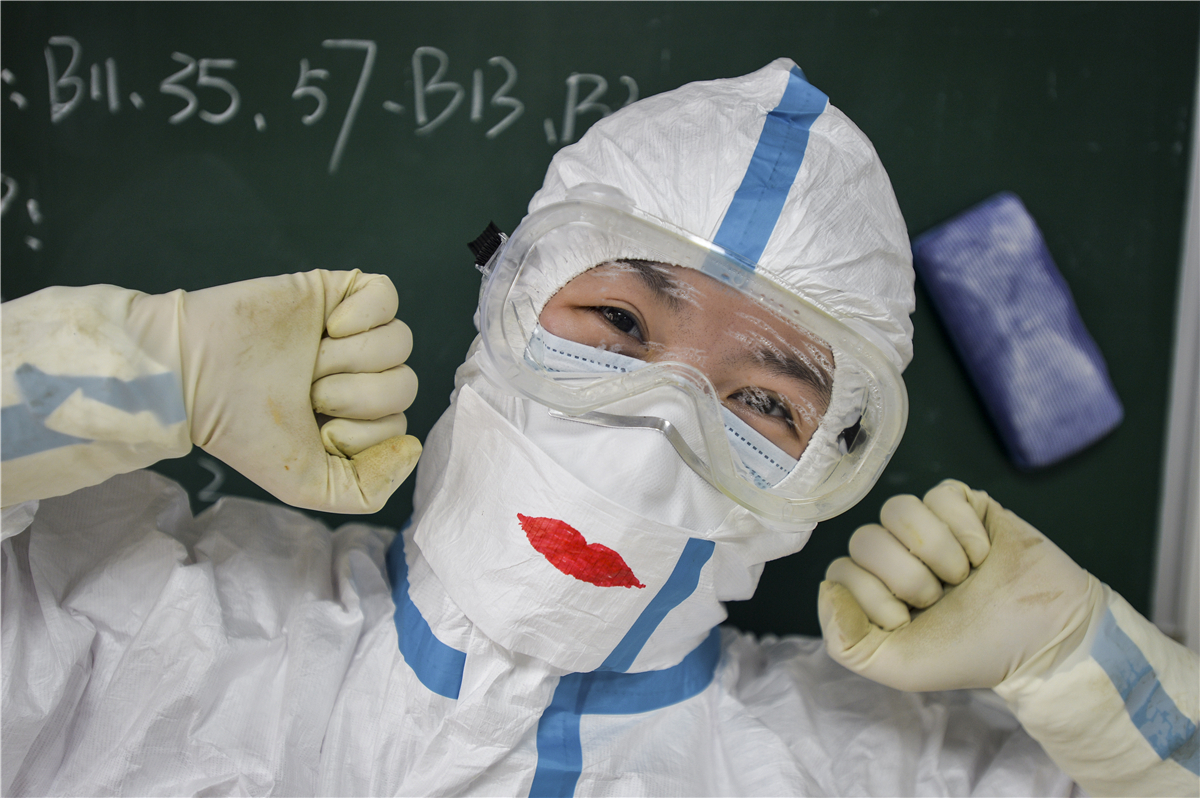吃大蒜預防新冠病毒感染?世衛(wèi)組織澄清13個虛假傳言 World Health Organization debunk 13 of the biggest myths surrounding the outbreak
中國日報網(wǎng) 2020-02-18 13:45

吃大蒜預防新型冠狀病毒?使用紫外線燈可以殺滅病毒?注射肺炎疫苗能提供保護?世界衛(wèi)生組織近日揭穿了有關新型冠狀病毒的13個虛假傳言。

Medics comfort a newly admitted patient at Leishenshan Hospital in Wuhan on Feb 16. [Photo by Gao Xiang/for chinadaily.com.cn]
1. Hand dryers will not kill the coronavirus
干手器不能殺死冠狀病毒
Hand dryers alone cannot kill coronavirus.
只用干手器是無法殺死冠狀病毒的。
Rumors have claimed using the hot air from the dryer for 30 seconds will rid any trace of the virus on your hands.
有傳言稱,用干手器烘干30秒鐘,就能完全滅除手上的冠狀病毒。
Above all, people should focus on keeping their hands clean.
最重要的是,人們應該重點保持雙手清潔。
'To protect yourself against the novel coronavirus, you should frequently clean your hands with an alcohol-based hand rub or wash them with soap and water,' the WHO said.
世界衛(wèi)生組織稱:“為了免受新型冠狀病毒的侵襲,你應該經(jīng)常用含酒精的洗手液洗手,或用肥皂和水洗手。”
'Once your hands are cleaned, you should dry them thoroughly by using paper towels or a warm air dryer.'
“洗完手后,應該用紙巾或熱風干手器把手徹底擦干或吹干。”
2. Ultraviolet lamps cannot sterilize the skin
紫外線燈無法為皮膚消毒
Ultraviolet lamps will not sterilize the skin.
紫外線燈無法為皮膚消毒。
They could, however, cause skin irritation, the WHO warned.
世界衛(wèi)生組織警告說,它們反而可能刺激皮膚。
Long term, UV radiation which also comes from the sun can damage the DNA in cells, which in turn may lead to cancer. It's for this reason that tanning beds are advised against.
長期來看,紫外線輻射會破壞細胞中的脫氧核糖核酸(DNA),進而可能引發(fā)癌癥。太陽光中也有紫外線。因此不建議使用日光浴床。
Hospitals and laboratories often use ultraviolet UV light to kill microbes, but never use it around humans.
醫(yī)院和實驗室經(jīng)常使用紫外線燈滅菌,但是在無人的環(huán)境下使用。
3. Eating garlic is not protective
吃大蒜沒有保護作用
Garlic is a healthy food that may have some antimicrobial properties, the WHO said.
世界衛(wèi)生組織說,大蒜是一種健康食品,可能具有某些抗菌特性。
However, there is no evidence from the current outbreak that eating garlic has protected people from the novel coronavirus.
但從目前的疫情來看,沒有證據(jù)表明吃大蒜能使人們免受新型冠狀病毒感染。
An online post went viral after claiming a bowl of boiled garlic water can cure the novel coronavirus.
之前有網(wǎng)帖稱,煮開的大蒜水可以殺滅新型冠狀病毒,隨后該帖被瘋狂轉(zhuǎn)發(fā)。
Facebook has since blocked the post because 'the primary claims in the information are factually inaccurate.'
臉書之后屏蔽了該帖,因為“信息中的主要說法實際上是不準確的”。
4. Sesame oil doesn't block coronavirus from entering the body
芝麻油不能阻止新型冠狀病毒感染
Contrary to rife rumors, rubbing sesame oil onto the skin won't block coronavirus from entering the body.
與流行的傳言相反,往皮膚上抹芝麻油并不能阻止冠狀病毒進入人體。
The WHO said, 'No. Sesame oil does not kill the novel coronavirus.'
世界衛(wèi)生組織說:“不。芝麻油無法殺死新型冠狀病毒。”
This is because transmission is believed to occur when an infected person sneezes, and droplets land in a person's mouth or nose, or they inhale it from the air.
這是因為,據(jù)目前的信息顯示,感染者打噴嚏后,飛沫濺落到他人口鼻中,或者他人從空氣中吸入飛沫時才會發(fā)生病毒傳播。
Close contact with someone infected also raises the risk. According to the Center of Disease Control and Prevention, spread from person-to-person can happen from six feet apart.
與感染者密切接觸也會增加患病風險。根據(jù)美國疾病控制和預防中心的說法,距離6英尺(約合1.8米)遠就可能發(fā)生人與人之間的傳播。

The couple Gao Yongzhe and Huang Wenli make a heart shape with their hands in Wuhan's Fang Cang makeshift hospital on Feb 14, 2020. [Photo by Gao Xiang/chinadaily.com.cn]
5. Spraying alcohol or chlorine over your body will not get rid of the virus
在身上噴酒精或含氯消毒劑不會清除體內(nèi)的新型冠狀病毒
Once novel coronavirus is in your system, spraying substances like alcohol and chlorine on the skin will not be of any use.
一旦新型冠狀病毒進入人體內(nèi),在皮膚上噴灑酒精和含氯消毒劑等等就毫無用處了。
But generally, there are some powerful chemical disinfectants that can kill coronaviruses on surfaces, according to the WHO. These include bleach and chlorine-based disinfectants.
但根據(jù)世界衛(wèi)生組織的說法,通常情況下,一些強效的化學消毒劑可以殺死物體表面上的冠狀病毒。這些消毒劑包括漂白劑和含氯消毒劑。
disinfectant[?d?s?n?fekt?nt]:n.消毒劑
They should not be used on the skin, as this can be dangerous. It is also not recommended to sniff it.
不過這些消毒劑不應該用于皮膚,因為這很危險,也不建議吸入。
They could be harmful to mucous membranes.
它們可能對黏膜有害。
The WHO said: 'Be aware that both alcohol and chlorine can be useful to disinfect surfaces, but they need to be used under appropriate recommendations.'
世界衛(wèi)生組織說:“要注意,酒精和含氯消毒劑給物體表面消毒是有用的,但要根據(jù)恰當?shù)慕ㄗh使用。”
6. Thermal scanners won't always detect infected people
熱掃描儀無法發(fā)現(xiàn)所有感染者
Thermal scanners are being used worldwide at airports and railway stations. They can detect people with a fever - a temperature higher than normal.
全球的機場和火車站都在使用熱掃描儀。熱掃描儀能檢測出發(fā)熱的人。
'However, they cannot detect people who are infected but are not yet sick with fever,' the WHO said.
世界衛(wèi)生組織說:“但熱掃描儀無法檢測出未發(fā)燒的感染者。”
It takes two to ten days before people who are infected become sick and develop a fever. In some people, it's taken 14 days.
被感染者可能在兩到十天的潛伏期后才會發(fā)病和發(fā)燒。有些人潛伏期長達14天。
7. Letters or packages from China do not carry coronavirus
來自中國的信件和包裹不攜帶冠狀病毒
It is safe to receive packages from China, the WHO said. Analysis shows coronaviruses do not survive very long on objects - especially flying between countries.
世界衛(wèi)生組織說,收取來自中國的包裹是安全的。分析表明,冠狀病毒不會在物體上存活太長時間。
People questioned exactly how novel coronavirus spreads and if it can arrive by mail.
人們問及新型冠狀病毒究竟如何傳播,以及是否可以通過包裹傳播。
There is nothing to suggest this is the case.
沒有證據(jù)表明這種病毒可通過包裹傳播。
8. Pets can't get ill with coronavirus
寵物不會染上冠狀病毒
At present, there is no evidence that pets can be infected by coronavirus.
目前尚無證據(jù)表明寵物會感染冠狀病毒。
Chinese nationals have made make-shift face masks for their cats who fear their felines could catch the deadly virus.
一些中國人給他們的貓咪制作了臨時口罩,擔心貓會感染這種致命病毒。
makeshift[?me?k???ft]:adj.臨時湊合的
Such measures are unnecessary, the WHO said.
世界衛(wèi)生組織說,這樣的措施并無必要。
The agency added: 'It is always a good idea to wash your hands with soap and water after contact with pets. This protects you against various common bacteria such as E.coli and Salmonella that can pass between pets and humans.'
該機構(gòu)補充說:“與寵物接觸后用肥皂和水洗手是個好辦法。這可以保護你免受大腸桿菌和沙門氏菌等各種常見細菌侵襲,這些細菌可以在寵物和人之間傳播。”

Niu Chunjuan, a nurse at the community health center on Hongchenggang Street, shows her "smile" to the camera after finishing her work in the morning, on Feb 10, 2020. [Photo by Shi Yi/Provided to chinadaily.com.cn]
9. Vaccines against pneumonia won't protect against novel coronavirus
預防肺炎的疫苗無法抵御新型冠狀病毒
Vaccines for novel coronavirus are still in the making and are unlikely to be finished in time to curb the current outbreak.
新型冠狀病毒疫苗仍在研制中,近期不太可能研制出來從而遏制當前疫情。
Researchers across the world are racing to develop a drug with the WHO support.
在世界衛(wèi)生組織的支持下,全球的研究人員都在競相研制藥物。
Jabs for pneumonia - which can be caused by novel coronavirus - will not work. These include pneumococcal vaccine and Haemophilus influenza type B (Hib) vaccine.
肺炎(新型冠狀病毒可引發(fā)肺炎)疫苗對預防新冠肺炎無效。這些疫苗包括肺炎球菌疫苗和B型流感嗜血桿菌疫苗。
10. Saline nose spray won't protect you
鹽水噴鼻劑無法保護你
There is no evidence that regularly rinsing the nose with saline has protected people from infection with the novel coronavirus, the WHO said.
世界衛(wèi)生組織說,沒有證據(jù)表明定期用鹽水洗鼻能使人們免受新型冠狀病毒的侵襲。
Some evidence suggests the old wives tale can help people recover more quickly from the common cold because cells in the body use the chloride in salt to produce hypochlorous acid (HOCI) which is the active ingredient found in bleach.
一些證據(jù)表明,鹽水洗鼻可以幫助人們更快地從普通感冒中恢復過來,因為人體細胞利用鹽中的氯生成次氯酸,這是漂白劑中發(fā)現(xiàn)的活性成分。
But there is nothing supporting the method against other respiratory infections, including the novel coronavirus.
但是沒有任何證據(jù)支持這種方法能對抗其他呼吸道感染,包括新型冠狀病毒。
11. Gargling mouthwash offers no protection
漱口水無法提供保護
Mouthwash cannot protect you from infection with the novel coronavirus.
漱口水無法保護你不感染新型冠狀病毒。
Some brands or mouthwash can eliminate certain microbes for a few minutes in the saliva in your mouth.
某些品牌的漱口水可以清除唾液中的某些細菌,但效果只能維持幾分鐘。
'However, this does not mean they protect you from novel coronavirus infection,' WHO said.
世界衛(wèi)生組織說:“但這并不意味著它們能保護你免受新型冠狀病毒感染。”
12. Young people can also get novel coronavirus
年輕人也可能感染新型冠狀病毒
Young people are also at risk of novel coronavirus, despite patterns showing the elderly are struck more often.
年輕人也可能感染新型冠狀病毒,盡管有例證表明老年人更易感。
Older people, and people with pre-existing medical conditions such as asthma, diabetes, heart disease, appear to be more vulnerable to becoming severely ill with the virus.
老年人以及有哮喘、糖尿病、心臟病等病史的人似乎更容易感染后發(fā)展為重癥。
WHO advises people of all ages to take steps to protect themselves from the virus, for example by following good hand hygiene and good respiratory hygiene.
世界衛(wèi)生組織建議,所有年齡段的人都要采取措施保護自己免受感染,例如保持良好的手部衛(wèi)生和呼吸道衛(wèi)生。
13. Antibiotics will not treat novel coronavirus
抗生素無法治療新型冠狀病毒
Novel coronavirus is a virus and, therefore, antibiotics should not be used as a means of prevention or treatment. Antibiotics only work against bacterial infections.
新型冠狀病毒是一種病毒,因此抗生素不應用于預防或治療。抗生素只對細菌感染有效。
'If you are hospitalized for the novel coronavirus, you may receive antibiotics because bacterial co-infection is possible,' the WHO said.
世界衛(wèi)生組織說:“如果你因為感染新型冠狀病毒住院,或?qū)⒔邮芸股刂委煟驗榭赡軙l(fā)生合并感染。”
To date, there is no specific medicine recommended to prevent or treat the novel coronavirus.
截至目前,尚無專門藥物可預防或治療這種新型冠狀病毒。
Some specific treatments are under investigation, and will be tested through clinical trials.
一些特定治療方法正在研究中,并將通過臨床試驗檢驗。
英文來源:每日郵報
翻譯&編輯:yaning

















 英語點津微信
英語點津微信 雙語小程序
雙語小程序